
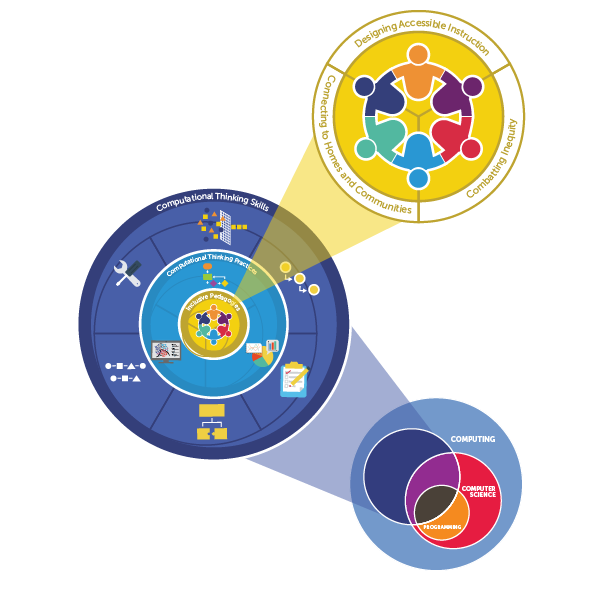 In our increasingly technological society, computational thinking skills and practices are fundamental to virtually every career path and generally in civic life. As such, opportunities to learn computational thinking are important to all learners. Large inequalities continue to exist in access to equipment and learning opportunities needed to build computational thinking skills for students that have been historically and systematically excluded. We call all educators to integrate computational thinking into disciplinary learning across K-12 education, while centering inclusivity, to equip students with the skills they need to participate in our increasingly technological world and promote justice for students and society at large. Learn more in our report Computational Thinking for an Inclusive World and explore our CT Pathways Toolkit for school district leaders to learn how to create system-wide, K-12 pathways supporting equitable participation in computational thinking that is consistent across classrooms, cumulative from year to year, and competency-based.
In our increasingly technological society, computational thinking skills and practices are fundamental to virtually every career path and generally in civic life. As such, opportunities to learn computational thinking are important to all learners. Large inequalities continue to exist in access to equipment and learning opportunities needed to build computational thinking skills for students that have been historically and systematically excluded. We call all educators to integrate computational thinking into disciplinary learning across K-12 education, while centering inclusivity, to equip students with the skills they need to participate in our increasingly technological world and promote justice for students and society at large. Learn more in our report Computational Thinking for an Inclusive World and explore our CT Pathways Toolkit for school district leaders to learn how to create system-wide, K-12 pathways supporting equitable participation in computational thinking that is consistent across classrooms, cumulative from year to year, and competency-based.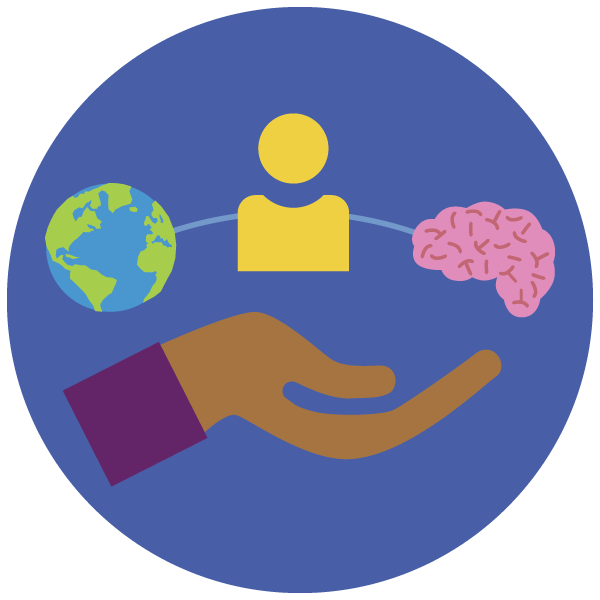 With an eye toward learner variability, we elevate research that has an impact on students who have been historically and systematically excluded. This year we conducted a refresh of the Learner Variability Navigator with a lens toward equity by soliciting perspectives and feedback from educators and edtech teams. We’ve added a Sense of Belonging factor to our Learner Models, as well as culturally responsive practices for learners, such as building empathy, developing cultural awareness, and discussing race. We also developed a Culturally Responsive Practice Guide, led by Kelisa Wing, one of our advisory board members, to provide educators questions and protocols to apply culturally responsive instruction as they address learner variability. Our 2021-2022 season of webinars included National Teacher of the Year, Juliana Urtubey, on Creating a Sense of Belonging: A Critical Need For Student Engagement and Success.
With an eye toward learner variability, we elevate research that has an impact on students who have been historically and systematically excluded. This year we conducted a refresh of the Learner Variability Navigator with a lens toward equity by soliciting perspectives and feedback from educators and edtech teams. We’ve added a Sense of Belonging factor to our Learner Models, as well as culturally responsive practices for learners, such as building empathy, developing cultural awareness, and discussing race. We also developed a Culturally Responsive Practice Guide, led by Kelisa Wing, one of our advisory board members, to provide educators questions and protocols to apply culturally responsive instruction as they address learner variability. Our 2021-2022 season of webinars included National Teacher of the Year, Juliana Urtubey, on Creating a Sense of Belonging: A Critical Need For Student Engagement and Success.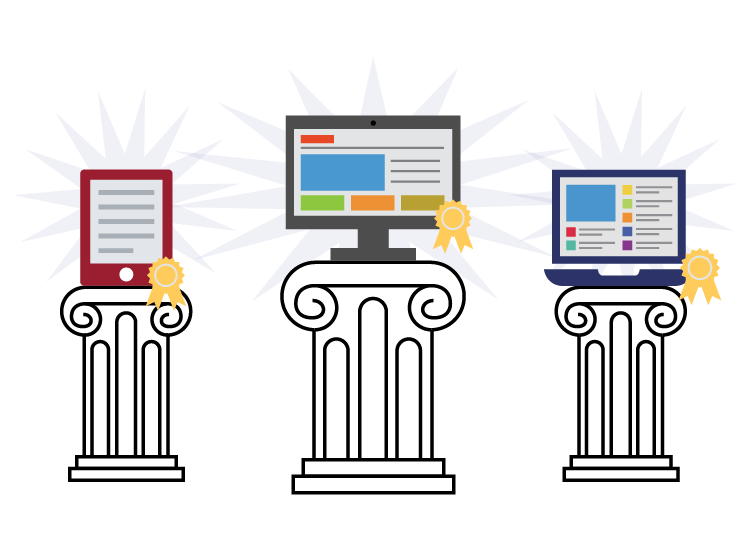 Digital Promise’s Product Certifications signal to education leaders, educators, and communities which products are intentionally designed to provide powerful learning opportunities for each unique learner. We partner with context and content experts to identify the expectations the field has for specific competencies within edtech products. Once we establish those expectations—or certification criteria—we build an application that requires edtech companies to submit evidence to demonstrate that they’ve met those expectations. We’ve worked with the field to develop a Research-Based Design and Learner Variability Product Certification, and we are working with partners to develop Universal Design for Learning, Data Interoperability, and Prioritizing Racial Equity in AI Product Certifications. By making it easier for educators to identify high-quality tools, the initiative accelerates the adoption of powerful learning practices with edtech.
Digital Promise’s Product Certifications signal to education leaders, educators, and communities which products are intentionally designed to provide powerful learning opportunities for each unique learner. We partner with context and content experts to identify the expectations the field has for specific competencies within edtech products. Once we establish those expectations—or certification criteria—we build an application that requires edtech companies to submit evidence to demonstrate that they’ve met those expectations. We’ve worked with the field to develop a Research-Based Design and Learner Variability Product Certification, and we are working with partners to develop Universal Design for Learning, Data Interoperability, and Prioritizing Racial Equity in AI Product Certifications. By making it easier for educators to identify high-quality tools, the initiative accelerates the adoption of powerful learning practices with edtech.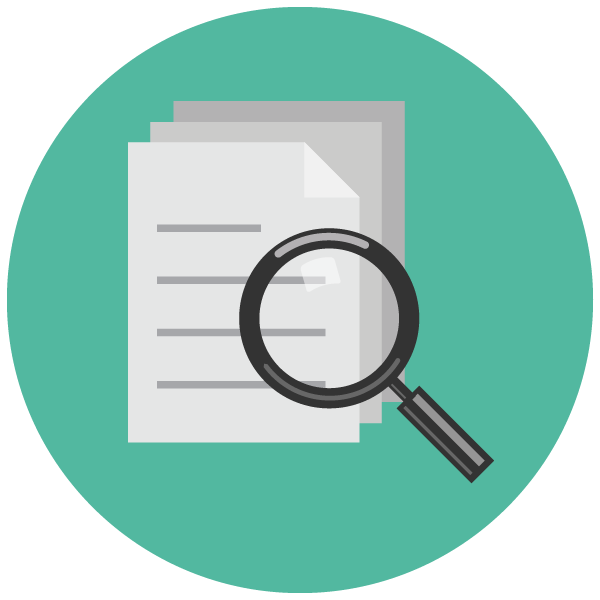 Project Topeka is helping historically and systematically excluded students get access to instant feedback to improve their argumentative writing. Their teachers also receive access to resources and training to lead their students in a high-quality, iterative writing process. We’ve also teamed up with Greater Good to explore what the future of student-driven, artificial intelligence (AI)-powered writing instruction should look like.
Project Topeka is helping historically and systematically excluded students get access to instant feedback to improve their argumentative writing. Their teachers also receive access to resources and training to lead their students in a high-quality, iterative writing process. We’ve also teamed up with Greater Good to explore what the future of student-driven, artificial intelligence (AI)-powered writing instruction should look like.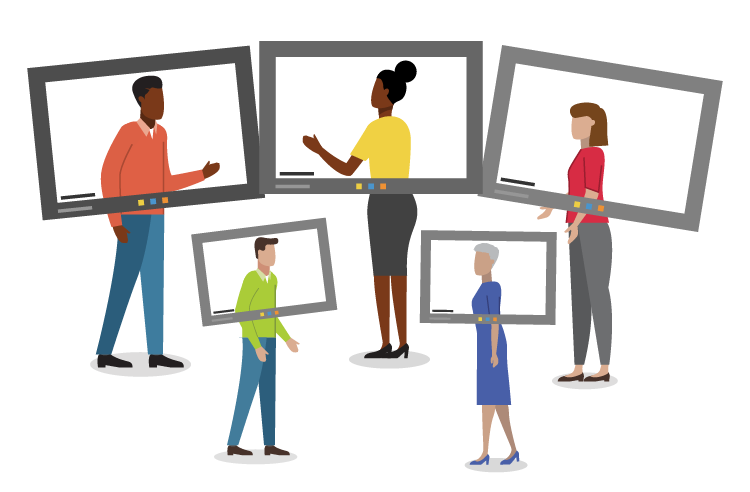 Through the Verizon Innovative Learning Schools (VILS) initiative, we ensure historically and systematically excluded students have reliable high-speed internet access to deeply engage in learning. The VILS 1:1 model provides every student and teacher at select Title I middle and high schools across the country with devices and data plans. Additionally, a new hotspot model provides mobile hotspots with data plans to students who have dedicated devices, but lack reliable internet access at home. With the addition of 246 schools during the 2020-21 school year—the largest cohort to date—the program has reached a total of 511 schools in eight years.
Through the Verizon Innovative Learning Schools (VILS) initiative, we ensure historically and systematically excluded students have reliable high-speed internet access to deeply engage in learning. The VILS 1:1 model provides every student and teacher at select Title I middle and high schools across the country with devices and data plans. Additionally, a new hotspot model provides mobile hotspots with data plans to students who have dedicated devices, but lack reliable internet access at home. With the addition of 246 schools during the 2020-21 school year—the largest cohort to date—the program has reached a total of 511 schools in eight years.